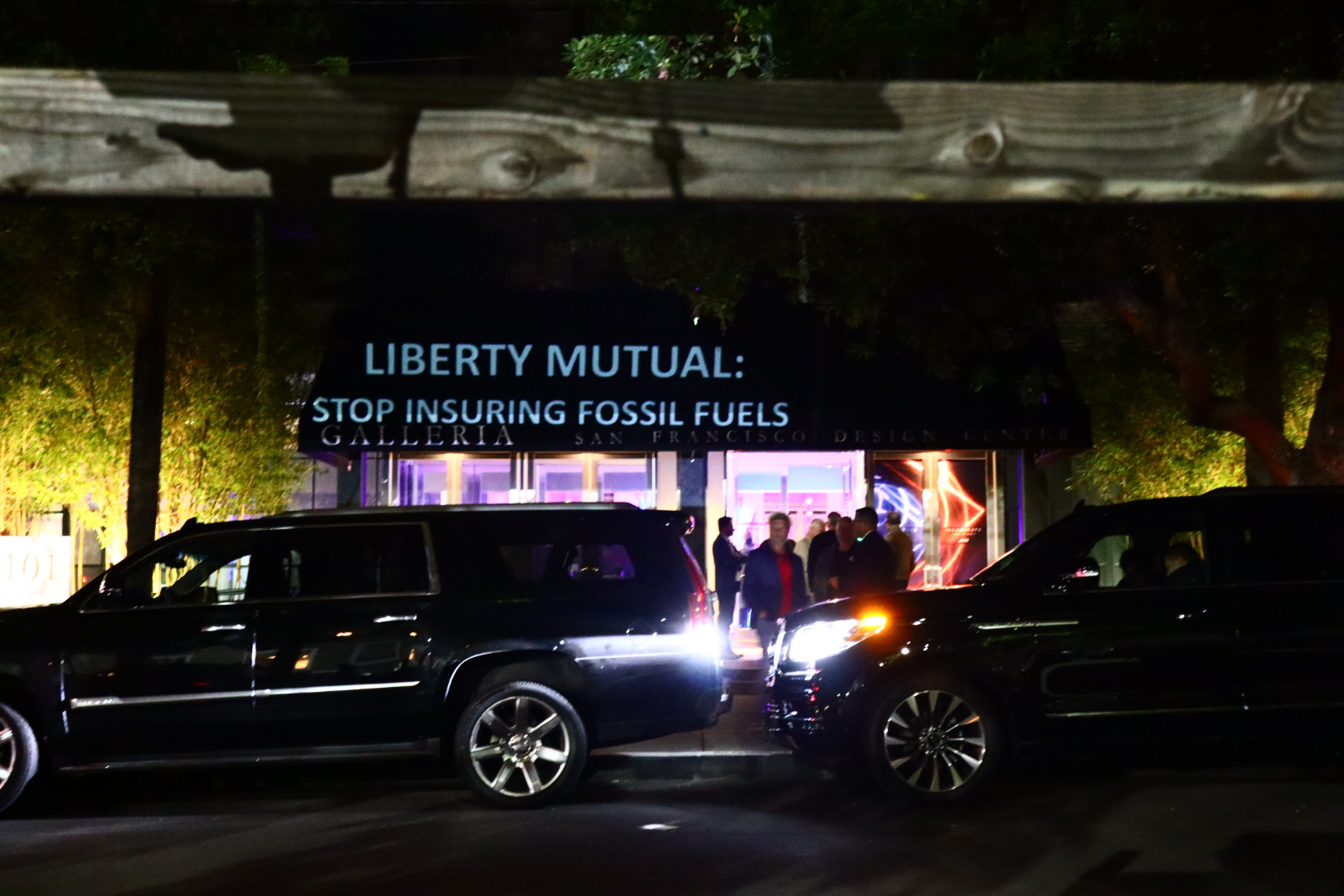Activists spotlighted Liberty Mutual’s role as a climate laggard at the RIMS RISKWORLD Conference
Photos can be found here.
Boston, MA // San Francisco, CA (April 15, 2022) – Liberty Mutual ended its annual policyholder meeting after just six minutes on Wednesday, ignoring hundreds of customer questions submitted to the company about its role in enabling fossil fuel expansion that the planet cannot afford. In response to the growing movement of grassroots activists, Indigenous Peoples, and investors calling on insurers to take action on climate and human rights, Liberty Mutual did release two new reports yesterday on the company’s sustainability commitments but did not announce any new policies or goals.
Despite acknowledging that “fossil fuels are the driving factor contributing to climate change,” Liberty Mutual’s 2021 Environmental, Social, and Governance Review and 2021 Task Force on Climate-Related Financial Disclosures Report hardly address Liberty’s own role in enabling the buildout of coal, oil, and gas infrastructure. The Boston-based insurance giant does not rule out insuring tar sands oil, Arctic drilling, or new oil and gas projects or outline any concrete steps and timelines to phase out insuring carbon-intensive energy sectors beyond its existing coal policy. Furthermore, the reports do not mention Indigenous rights or human rights more broadly.
“As global insurers exit the coal and tar sands oil sector and increasingly adopt policies limiting insurance for oil and gas expansion projects, Liberty Mutual is continuing to provide a lifeline to the fossil fuel industry,” said Elana Sulakshana, Energy Finance Campaigner at Rainforest Action Network. “It is completely two-faced of Liberty Mutual to recognize that climate change is a massive threat to the planet, while it continues to invest in and insure fossil fuel megaprojects like offshore drilling the Trans Mountain tar sands pipeline.”
In response to these disappointing and insubstantial reports, Indigenous Environmental Network and Rainforest Action Network projected clear messages for Liberty Mutual executives outside the RIMS 2022 RISKWORLD conference closing party on Thursday (photos here).
“As one of the biggest oil and gas insurers globally, Liberty Mutual has backed fossil fuel expansion projects across the world that have not obtained the Free, Prior, and Informed Consent of impacted Indigenous communities, including oil drilling in sensitive ecosystems off the coast of Brazil to tar sands extraction and pipeline projects, including the Trans Mountain network,” said Mea Johnson, Divestment Campaigner with Indigenous Environmental Network. “Liberty executives have repeatedly refused to meet with frontline and Indigenous communities, and so we are bringing our demands directly to their doorsteps.”
The projection targeting Liberty Mutual was part of a flurry of activities in San Francisco targeting the insurance industry at the RISKWORLD conference, including a 30-foot mural painted at the opening ceremony on Sunday, a giant banner drop calling out Chubb on Tuesday, and wheatpaste poster designs throughout the city urging insurers to #DefundClimateChaos.
***
BACKGROUND
There is growing momentum in the insurance sector to accelerate a just energy transition, but Liberty Mutual is continuing to lag behind its peers:
- Globally, 38 insurance companies have ended or limited their coverage for coal projects and/or companies. Liberty Mutual’s coal policy, which has not been strengthened since 2019, is riddled with loopholes that allow the company to continue insuring new coal projects.
- Furthermore, 17 insurers have limited or ended cover for tar sands oil, including U.S. peers AIG, Chubb, The Hartford, and Travelers. Liberty has not publicly commented on its support for the destructive sector and continues to back massive tar sands pipelines like Trans Mountain, making the company one of the few remaining major U.S. insurers without a tar sands policy.
- Eight insurers and reinsurers, including some of the biggest ones in the world, have committed to end or restrict underwriting for new oil and gas projects, following guidance from the International Energy Agency that there is no room for new fossil fuel supplies to achieve net zero emissions by 2050.

